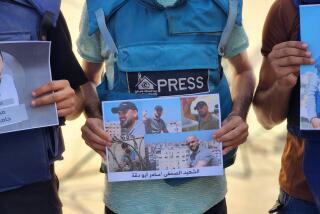A Double Standard in PBS Intifada Report?
- Share via
Cards on the table.
What was merely a suspicion now is supported by evidence: PBS has a pro-Jewish double standard when it comes to the intifada, the Palestinian rebellion against Israeli occupation of the West Bank and Gaza Strip.
The evidence is “A Search for Solid Ground: The Intifada Through Israeli Eyes,” at 10 tonight on Channels 28, 50 and 15.
It’s a very good documentary, by the way, one more balanced than the powerful “Days of Rage: The Young Palestinians,” the documentary that enraged many Jewish organizations even before it aired on PBS last September.
But that’s not the point.
Unbalanced treatment by PBS is the point.
Just as “Days of Rage” was undeniably pro-Palestinian concerning the intifada, so is “A Search for Solid Ground” aggressively on the side of the Israelis. Fair enough.
What isn’t fair is that the 60-minute “A Search for Solid Ground” is accompanied on PBS by only a 30-minute panel discussion.
Compare that with the expensive hour “wraparound”--consisting not only of a panel discussion but also of two rebutting mini-documentaries espousing the Israeli government point of view--that was imposed on the 90-minute “Days of Rage” in response to the controversy surrounding the program.
Allegations that producer Jo Franklin-Trout violated PBS guidelines by indirectly financing “Days of Rage” with “Arab money” from abroad were never proved.
“A Search for Solid Ground” complies with PBS guidelines in being underwritten by Americans with no formal ties to another nation, even though they are associated with Jewish organizations.
Steve Brand is the producer and Peter Kunhardt and Richard L. Plepler are the executive producers of “On Solid Ground,” which does not attempt to disguise its bias. You’re told that only “mainstream” Israelis--and no Palestinians--were interviewed.
Nevertheless, “On Solid Ground” expresses a wide range of Israeli opinion on the intifada. Advocates of the status quo--including some members of the government--are intermingled with proponents of talks with the Palestinian Liberation Organization (PLO), amid an occasional plea for letting the Palestinians establish nationhood in the territories in exchange for a secure peace. PLO talks and the so-called land-for-peace plan are opposed by Israeli Prime Minister Yitzhak Shamir and his hard-line Likud Party.
“On Solid Ground” gives the intifada historical and political context from the Israeli perspective in a way that tends to justify continued occupation of the territories. What it does best by far, though, is compellingly give vent to the frustrations of Israeli soldiers serving in the West Bank and Gaza Strip, humanizing this reluctant occupation force that the program admits is at times given to excess.
There are significant omissions here, one being that Shamir’s proposal for elections in the West Bank and Gaza Strip rigidly excludes the very PLO reported to be the preferred representatives of the vast majority of Palestinians.
A constant refrain throughout the program--even from some moderates--is that outsiders critical of Israel’s conduct in the territories should mind their own business. “Don’t come and preach to me,” declares an Israeli journalist.
At this point there’s a critical need to have someone on the program draw the obvious analogy to South Africans telling the rest of the world to butt out, or to the Kremlin denouncing the “outsiders” who relentlessly called attention to the plight of Jews inside the Soviet Union. Just as on “Days of Rage,” however, there is no one here to ask the tough questions.
In the main, “On Solid Ground” is a graceful and moving account of two peoples deeply locked in a conflict that victimizes each of them. Make no mistake about it, however, the message is that the suffering of the Israelis is much greater than that of the Palestinians.
The panelists who came on after “Days of Rage” were tilted toward Israel, and they largely bashed Franklin-Trout’s program before moving on to a wider discussion of the intifada. In contrast, the discussion following “On Solid Ground” is almost the reverse, with two of three panelists mostly siding with the Palestinians.
It’s an appropriately low-key tag that doesn’t upstage a worthwhile program, in contrast to the outrageous, elaborate attempt by PBS to diffuse “Days of Rage.”
More to Read
The complete guide to home viewing
Get Screen Gab for everything about the TV shows and streaming movies everyone’s talking about.
You may occasionally receive promotional content from the Los Angeles Times.






